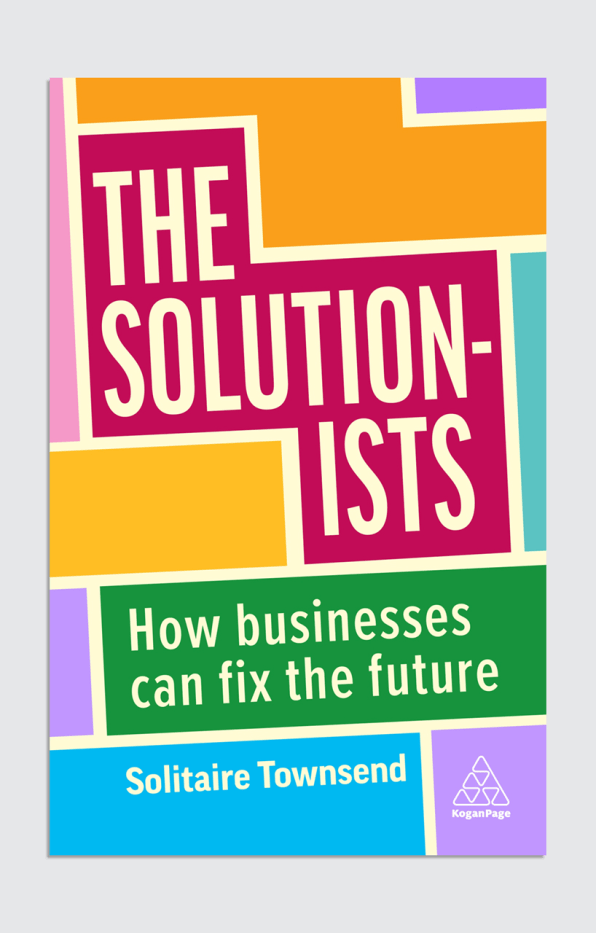- | 9:00 am
Thinking you can solve the world’s problems is a rare attitude. It needs to become a common one
The world needs more solutionists, writes Solitaire Townsend in her new book, ‘The Solutionists: How Businesses Can Fix the Future.’ In this excerpt, she explains what that means—and how to become one.

Solutionists are curious—in both meanings of that word. They are curious about the world around them, often on a lifelong quest to discover new things and find new answers. They are also curious people in that they are somewhat . . . odd.

I mean that in the most complimentary way, not least because I count myself among the ranks of the solutionists. Nevertheless, I admit that being the sort of person who likes untangling knots, who is kept awake by unsolved problems, and who has a strong sense that they absolutely can do something about world problems—isn’t a common attitude.
It must become one. Our communities, economies, businesses, and our families face an unprecedented convergence of seemingly intractable social, humanitarian, and environmental crises, the most complex and daunting of which is climate change. We’re all being asked questions about the future of humanity that desperately need answering.
That’s a job for solutionists. And if you’re not one already, you will be by the end of my book.
Many of the solutionists I’ve interviewed are successful in business not despite their awareness of the devastating risk of climate change, but because of it. They don’t approach social or eco-entrepreneurism and sustainable business as the latest fad or an additional value-add for business. Their companies, inventions, strategies, and solutions are designed explicitly to confront problems—that’s the solutionist way.
I’m rather immodestly pleased by how many of them enjoyed being dubbed “solutionist” as a term. It’s almost as if this new wave of changemakers have been waiting for a collective noun.
A SOLUTIONS ECONOMY
Today’s global economy is riddled with a mind-bending array of illogical and infuriating messes. Governments spend our money building new airports instead of public transport. Investment that could go into wind farms pours into fracking. More people have access to a mobile phone than access to a proper toilet. As pressures like climate change and social division build, these cracks are starting to show in our economies and in the societies they are supposed to support.
Of course, climate change is also the endgame for the old economy because in any competition of finance versus physics, physics always wins.
In multiple surveys across the world, most people believe capitalism in its current form is doing more harm than good.
So far, so downbeat, eh? Don’t worry, I’m still Chief Solutionist.
These cracks in the system are being inexorably forced from the outside by climate change, inequality, war, and pandemics all rupturing an economic order never built to cope with them. The pressure is also mounting from the inside.
I believe another economy, more fit for the moment, is growing within the shaky edifice of the current one, forcing its way into existence. It doesn’t fit the existing model’s shell—it is an altogether different shape. It belongs to a new mold, one whose curves and corners have been formed by today’s landscape of both mounting crises and booming creativity.
Too often, its bright outline is obscured in our media discourse on the rumblings, upheavals, and discontents in the old system. Look closer for the signs; an explosion of entrepreneurialism, a nexus of new technology and new business models, experiments with new forms of capital, and, of course, more and more solutionists deciding to step up.
In 2022, McKinsey modeled the implications of a world in which the UN’s climate goals are met, which, bluntly, we can’t afford not to do. They conclude that, in what I call a Solutionist Economy, “This wholesale shift toward institutions and projects that emit minimal greenhouse gases (GHGs) may create the largest reallocation of capital in history.” As they point out, already financial institutions responsible for more than $130 trillion of capital have declared that they will manage their assets in ways intended to hold warming below 1.5 degrees Celsius (or, 2.7 degrees Fahrenheit).
The financial win is impressive and challenges the orthodoxies of the old economy that we can’t afford climate action. In the Solutionist Economy, solving climate change solves everything else.
JOIN THE SOLUTIONISTS
I claim no ownership over the word solutionist, and I hope that in the years to come, when I search online for solutionist, thousands of people with that job title will pop up. I hope I’ve conveyed the rewards of becoming a solutionist, both financial and emotional. Those prizes are available right now and will only grow as we speed toward the Solutionist Economy.
I was also very moved by another incentive for urgency that the legendary former CEO of Unilever, Paul Polman, presented to me—the moral imperative: If you won this lottery ticket of life, with an education, medical care, food, access to electricity and toilet, well, you’re in only 5% of the world’s population, and you need to put yourself to the service of the other 95%. So, I stay hopeful because I know any other path, and it might be stupid, but any other path doesn’t lead to anything. And we frankly don’t have a choice. I sometimes say, and people laugh, but I sometimes say, “It’s too late to be a pessimist.“
Personally, I’m happy if you’re a solutionist in order to make your fortune, become famous, or prove to your high-school bully that you can change the world. However, I know that most of the people reading this book will resonate with Paul’s words. While being a solutionist is fun and financially rewarding, that’s not why most of us chose this path. We’re solutionists because we can’t not be.
Join us.
Grab a slip of paper and quickly brainstorm everything you could do that would make a difference. For example:
- Pitch to my boss that breakthrough solutions idea I had.
- Start a side hustle of that ecobusiness idea I’ve been thinking about.
- Sign up for an online course about sustainability.
- Start a Solutionist Team at work, for those passionate about change.
- Finish that book/blog post I’ve been working on.
- Build a business case for our company to pivot into solutions.
- Look for promising solutions startups to invest in.
- Sketch out a list of who might help me with my idea.
- Register for some online events/talks about sustainability.
- Offer to be non-executive/trustee of solutions startups.
- Create a presentation about solutions to inspire my team.
- Find online communities of solutionists to get some support from.
Then, looking at your list, think about what would be most fulfilling, most fun, most personally exciting. You’ve started your solutionists journey!
This excerpt from The Solutionists: How Businesses Can Fix The Future by Solitaire Townsend © 2023 is reproduced with permission from Kogan Page Ltd.







































